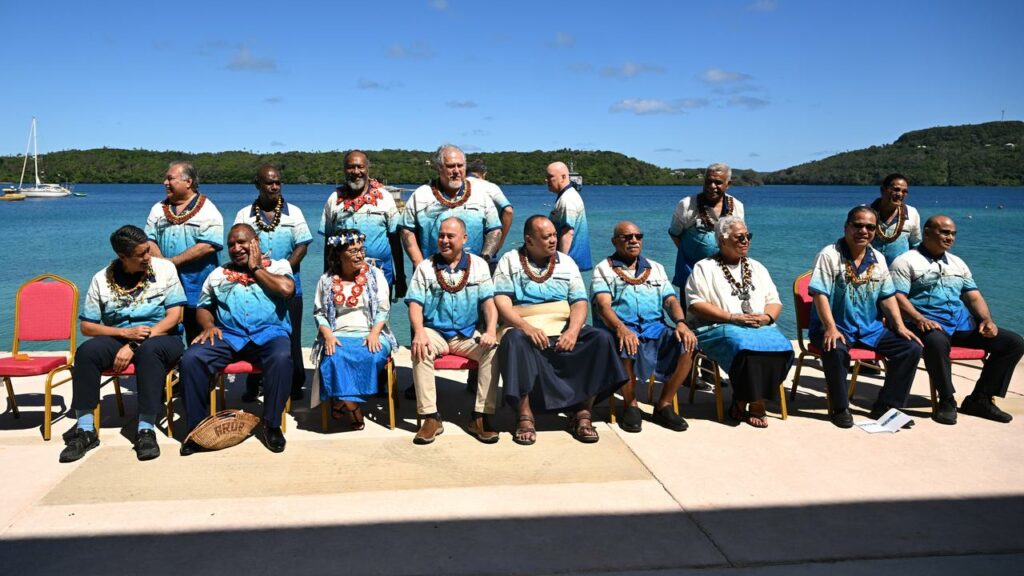Tonga pulls off rift-free Pacific Islands Forum
Ben McKay |

Tonga has overcome predictions the Pacific Islands Forum Leaders Meeting would be marred by disorganisation or stoushes, all while living up to its nickname of the friendly islands.
The annual summit of regional leaders wrapped up on Friday following an overnight leaders retreat in Vava’u.
Australian Prime Minister Anthony Albanese was one of a handful of leaders to skip that stay, leaving on Thursday night after a visit of less than 48 hours.
However, PIF Secretary General Baron Waqa gave a glowing review of the summit, given recent rifts that have bedevilled the organisation.
“It’s a testament to not just the unity but the solidarity,” he said.
“I’m very, very pleased with the outcome of this meeting and especially the the level of attendance, the level of participation from our dialogue partners and other non traditional partners.
“It came at the highest level, ministerial level. It’s unprecedented.

China, the United States, the European Union, France and other non-members sent delegations and every PIF leader attended, except for Kiribati, currently undergoing an election.
There were breakthrough talks on the thorniest issue: the future of New Caledonia – between colonial power France and Noumea which clears the way for a PIF leaders mission next month.
Guam and American Samoa will join the organisation as associate members.
The Australia-backed Pacific Policing Initiative won also support from leaders, though the communique noted that participation was subject to “national consultation”.
“As a government we agree, we endorse in principle this initiative,” Solomon Islands Prime Minister Jeremiah Manele said.
New Zealand Prime Minister Chris Luxon also confirmed his country’s support.
“100 per cent all in … and we’ll be contributing to it,” he said.
Veteran reporters who have covered multiple summits gave both Tongan and PIF organisers the tick of approval.
Adaptability were never more evidence than on Monday, when proceedings were barely impacted by a 6.6 magnitude earthquake and aftershocks just north of Tongatapu.
On the same day, Nuku’alofa experienced unseasonably heavy rain, causing delegates to walk through puddles of water several inches deep to move around the venue.
There was little fuss, some minor reshuffling of venues, and the can-do spirit that Pacific nations are well-known for.
Various reports in the lead-up to biggest-ever PIF Summit, which had more than 1500 delegates, painted a gloomy picture of Tonga’s readiness.
Those fears were not realised.
Accommodation – a central challenge to many hosts – was sorted with the help of demountable bedsits and new hotels.
“It’s amazing. The community, the church and that have all come together to provide hospitality to our visitors, our forum members and dialogue partners,” Tonga Prime Minister Hu’akavameiliku Siaosi Sovaleni said.
“I’m very happy we’ve had that support welcoming the Pacific and the world here to Tonga.”
There were still disagreements and awkward moments.
Top of that list was an ‘hot mic’ exchange by Mr Albanese with US Deputy Secretary of State Kurt Campbell, which showed chumminess between the two powers which may not be appreciated in all corners of the Pacific.
Mr Albanese attacked the ethics of a Radio NZ journalist for taking a recording of that exchange, even though it was in an accredited area.
Veteran reporter and academic Tess Newtown Cain came to the journalist’s defence.
“It’s absolutely not appropriate for an Australian prime minister to attack a journalist in a region which has issues with media freedom,” she told AAP.
“An Australian leader should be setting an example and supporting openness.”
It remains to be seen whether next year’s leaders meeting in Honiara will be so embracing, with Mr Manele refusing to guarantee that Taiwan would be welcome.
The Solomon Islands government – which recognised Taiwan over China until 2019 – stated at this summit that it does not see Taiwan as fully sovereign.
AAP